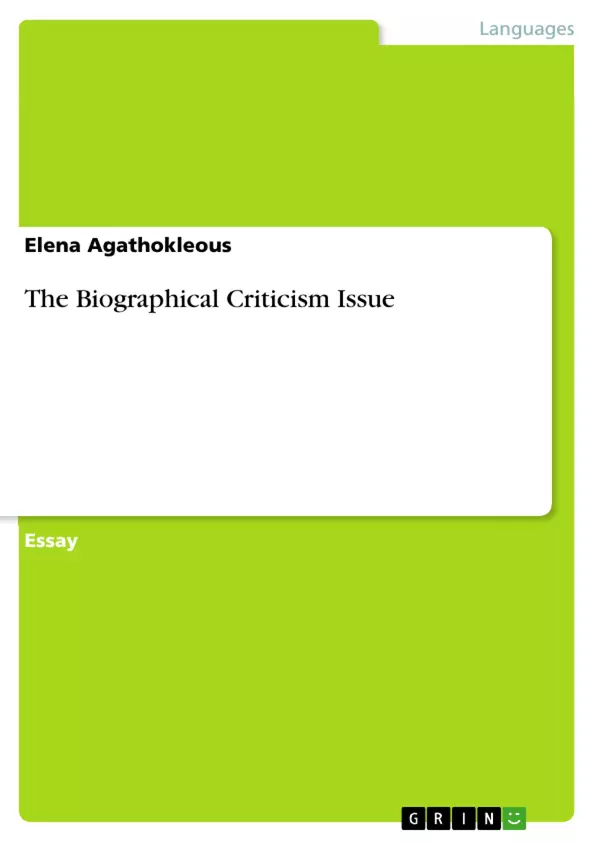An essay dealing with the known quote “What matter who’s speaking, someone said, what matter who’s speaking” by Samuel Beckett and which discusses the extent to which knowledge of a poet’s life and opinions should shape the interpretation of their poems. On the topic of biographical criticism the issue if it helps us illuminate the texts at hand, or that we miss possible meanings and echoes in the work when we focus on it is addressed.
Table of Contents
- The Biographical Criticism Issue
- Gertrude Stein’s Tender Buttons
- Stein’s Carafe and Cubist Poetics
- Pamela Hadas's Alternative Reading
- Sylvia Plath’s Daddy
- A Father-Daughter Relationship and its Opposition
- Irving Howe’s Limited Perspective
- T.S. Eliot’s The Love Song of J. Alfred Prufrock
- The Poem as a Dramatic Monologue
- Eliot's Impersonality and the Man vs. Poet Distinction
Objectives and Key Themes
This essay examines the role of biographical criticism in interpreting poetry. It explores the debate surrounding the relevance of a poet's life and opinions in understanding their work. The essay argues that while biographical criticism can be helpful in deciphering meaning, it should be used alongside other forms of criticism to avoid overshadowing the text's inherent possibilities.
- The relationship between biographical criticism and literary interpretation
- The interplay of personal experience and artistic expression in poetry
- The importance of contextual analysis in understanding poetic works
- The potential pitfalls of relying solely on biographical criticism
- The concept of impersonality in poetry and its relevance to critical evaluation
Chapter Summaries
The essay starts by introducing the debate surrounding biographical criticism, highlighting its historical development and key arguments for and against its use. It then delves into the works of three prominent poets: Gertrude Stein, Sylvia Plath, and T.S. Eliot.
Stein's "Tender Buttons" is examined through both a traditional literary lens and a biographical one. The essay explores how Stein's personal life and changing relationships may have influenced her unconventional use of language.
Plath's "Daddy" is analyzed in terms of its complex themes of patriarchy, oppression, and freedom. The essay highlights how biographical criticism has been used to both illuminate and diminish the poem's impact.
Eliot's "The Love Song of J. Alfred Prufrock" is presented as a prime example of a poem that can be understood through a variety of perspectives, including biographical ones. The essay explores the poem's themes of alienation, inadequacy, and the complexities of modern life.
Keywords
Biographical criticism, literary interpretation, poetic expression, personal experience, contextual analysis, impersonality, Gertrude Stein, "Tender Buttons", Sylvia Plath, "Daddy", T.S. Eliot, "The Love Song of J. Alfred Prufrock", Cubist poetics, modernism, free verse, oppression, alienation.
Frequently Asked Questions
What is biographical criticism in literature?
Biographical criticism is a method of interpretation that uses knowledge of a poet's life, experiences, and opinions to illuminate the meaning of their work.
What is the main argument against biographical criticism?
Critics argue that focusing too much on the author's life can lead to missing other possible meanings and echoes within the text itself, potentially limiting the poem's impact.
How does Sylvia Plath's "Daddy" relate to this issue?
The poem "Daddy" is often read through Plath's personal relationship with her father, but some critics argue this perspective can diminish the broader themes of patriarchy and oppression.
What does T.S. Eliot mean by "impersonality" in poetry?
Eliot suggested a distinction between the man who suffers and the mind which creates, arguing that the poet's personality should not be the primary focus of the work.
Can biographical criticism be used alongside other methods?
Yes, the essay argues that while helpful for deciphering meaning, it should be integrated with contextual and formal analysis for a more comprehensive understanding.
- Arbeit zitieren
- Elena Agathokleous (Autor:in), 2018, The Biographical Criticism Issue, München, GRIN Verlag, https://www.grin.com/document/1007701



